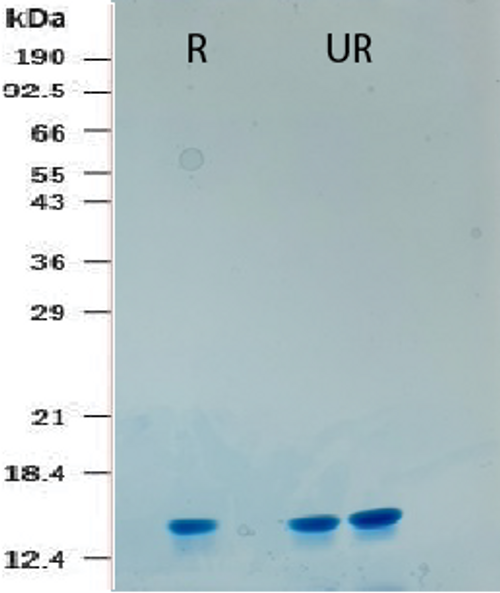IL-1α is a proinflammatory cytokine that is not secreted; it is produced by various cells like monocytes, tissue macrophages, keratinocytes, and other epithelial cells. Both IL-1α and IL-1β bind to the same receptor and share similar, if not identical, biological properties. These cytokines have diverse effects, including stimulating thymocyte proliferation by triggering IL-2 release, fostering B-cell maturation and proliferation, exhibiting mitogenic FGF-like activity, and prompting the release of prostaglandin and collagenase from synovial cells.
However, there is a notable difference: IL-1β is secreted, while IL-1α primarily remains associated with cells. The recombinant Human IL-1α is an 18.0 kDa protein comprising 159 amino acid residues.
|
Product Specifications
|
|
| Species | Human |
| Published species |
Human, Mouse
|
| Expression System | E. coli |
| Amino acid sequence |
SAPFSFLSNV KYNFMRIIKY EFILNDALNQ SIIRANDQYL TAAALHNLDE AVKFDMGAYK SSKDDAKITV ILRISKTQLY VTAQDEDQPV LLKEMPEIPK TITGSETNLL FFWETHGTKN YFTSVAHPNL FIATKQDYWV CLAGGPPSIT DFQILENQA
|
| Molecular weight | 18 kDa |
| Class | Recombinant |
| Type | Protein |
| Purity |
≥ 98% by SDS-PAGE gel and HPLC analyses.
|
| Endotoxin concentration | <0.1 EU/µg |
| Activity |
Determined by its ability to stimulate the proliferation of mouse D10S cells. The expected ED50 is ≤0.001 ng/ml, corresponding to a specific activity of ≥1 x 10^9 units/mg.
|
| Conjugate | Unconjugated |
| Form | Lyophilized |
| Contains |
no preservative
|
| Storage conditions | -20°C |
CAUTION
For Research Use Only. Not for use in diagnostic procedures.















